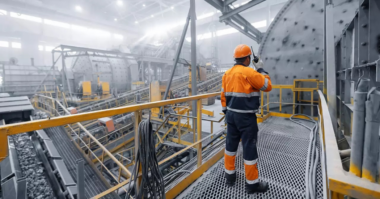Just as HTML spurred growth of the Web, the new Open Platform Communication Unified Architecture (OPC UA) interoperability standard will enable industrial players to unlock the full potential of Industry 4.0.
In an announcement published today by the OPC Foundation, the organization states its vision of becoming the worldwide industrial interoperability standard. This seamless IIoT communication standard, called Open Platform Communication Unified Architecture will apply for all levels of industrial automation. Combined with Time Sensitive Networking (OPC UA over TSN) it will be able to replace a myriad of different fieldbus systems. Forecasting the end of disparate protocols, it will enable devices from different vendors to talk to each other – from the field level to the controller level all the way to the cloud.
ABB is committed to support the industry-wide adoption of OPC UA over TSN. At the vanguard of driving interoperability in industrial automation, ABB and B&R – the acquired and integrated solutions provider for machine and factory automation – have played a pivotal role in bringing together industry stakeholders to establish an open standards based communication for Industrial IoT. Additionally, ABB will take up a designated seat on the board of the OPC Foundation in 2019 to further help accelerate development of the new technology.
As OPC UA over TSN is vendor neutral, customers will no longer see their efforts complicated by incompatible protocols or proprietary ecosystems. This will facilitate integration and spur innovation – an imperative as the Fourth Industrial Revolution accelerates digitalization via the interconnection of billions of smart devices worldwide.
“ABB has long been a pioneer within the automation industry developing leading-edge technologies to deliver solutions to some of industry’s greatest challenges,” said Peter Terwiesch, President, ABB Industrial Automation Division. “That we have taken a leading role in reaching this historic milestone for open standards and interoperability in industrial automation, which will see major dividends for both customers and suppliers alike, is further testament to our commitment, expertise and vision to unlock the full potential of Industry 4.0.”
Adoption of the OPC UA over TSN standard will allow companies to leverage the benefits of multi-vendor, peer-to-peer communications and control between sensors, control devices, programmable logic controllers and distributed control systems without the need for costly and time-consuming software development and cumbersome gateways and bridges.
“Customers across the industrial landscape will no longer be bound to suppliers based on the communications protocol used,” said Bernhard Eschermann, CTO, ABB Industrial Automation Division and designated board member of OPC Foundation. “Adoption of the new standard will open up cross-industry collaboration and encourage partnerships driven by what creates the most value for customers.”
ABB (ABBN: SIX Swiss Ex) is a pioneering technology leader in power grids, electrification products, industrial automation and robotics and motion, serving customers in utilities, industry and transport & infrastructure globally. Continuing a history of innovation spanning more than 130 years, ABB today is writing the future of industrial digitalization with two clear value propositions: bringing electricity from any power plant to any plug and automating industries from natural resources to finished products. As title partner in ABB Formula E, the fully electric international FIA motorsport class, ABB is pushing the boundaries of e-mobility to contribute to a sustainable future. ABB operates in more than 100 countries with about 147,000 employees. www.abb.com.




